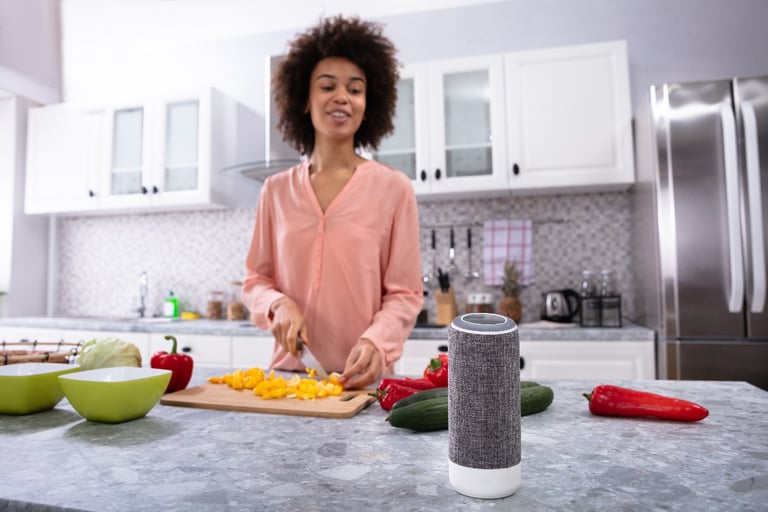In today’s digital world, the way in which we interact with machines is rapidly changing. Thanks to advancements in artificial intelligence, experiences that started out via screens, buttons, clicks and swipes, have quickly evolved into sophisticated voice interfaces. In 2019, over 66 million people in the US (about 26% of the total population) owned a smart speaker, with similar numbers worldwide, and those numbers are only projected to increase. Just a few short years after their conception, we’ve quickly adopted these agents, using them to automate and simplify numerous tasks in our routines, around the house, at the office, and on the go.
Yet despite how smart our technology has become, the way in which we interact with it is still primarily the same as it’s always been. It’s command-based, unidirectional, and identical for each of us – we give machines commands, and they execute accordingly. And though voice assistants have learned how to recognize certain inputs, they still have plenty of NLP limitations, and they don’t truly understand our individual needs, preferences, or personalities. As AI continues to evolve, the way in which we interact with it – and the human-machine relationship altogether – is about to transform dramatically.
We value any form of social connection, and growing human-machine research indicates that people can, and do, form meaningful attachment and connections to machines rather easily. Be honest – have you ever referred to or treated your Roomba like a pet? Going forward, people will want their interactions with machines to be even more smooth, seamless, and personalized just for them. Given the massive popularity of voice operated devices, it’s safe to assume that voice interfaces are here to stay, but voice isn’t the only important aspect of effective human-machine interaction and communication.
Voice interfaces will likely emerge into more comprehensive agents, using multiple modalities to interact with us in a way that’s more natural, effective, and immersive. With digital companion agents, this far-fetched sounding notion is not far from our reality. Taking voice assistants to the next level, these intelligent AI agents will be at our side, embedded into the devices we already know and love, such as cars, appliances, wearables, and otherwise. Ultimately, they’ll learn how to optimally interact with each of us, creating meaningful, customized experiences that simplify our lives and amplify our abilities like never before.
The shift from digital assistants to digital companions

The Association for Computing Machinery defines a digital companion as a “cognitive agent that assists human users by taking on three roles: as guardians, assistants or mentors, and partners.” The natural evolution of digital assistants, digital companion agents replace utilitarian voice command with a bidirectional relationship based on empathy, trust, and anticipation of needs, to effectively influence behaviors and emotions. And rather than communicating entirely via voice, these agents carry out comprehensive, multimodal interactions that can include, but aren’t limited to: speech, UI displays, sound, media, movement, and LEDs.
Through sensory inputs and advanced proprietary algorithms, digital companion agents learn their user and environment over time, to understand situational context and adequately engage with each user in the ideal format, at the opportune moment. Using a cognitive, goal-based AI decision-making system to decide the best course of action to take, the agent offers smart suggestions, updates, conversation, and otherwise – all customized for each individual user.
In other words, it intuitively knows if, when, and how to engage with each of us most effectively. Instead of waiting for our command like a voice assistant would, a digital companion learns, remembers, and anticipates each of our individual needs and preferences, adjusting and executing their interactive experience accordingly. Whether that’s intuitively remembering how often we like to interact and in which particular style, how to interact in a group vs. individual setting, what type of information we prefer to receive, our likes, dislikes, and beyond. By proactively anticipating our needs and preferences, the agents work alongside us harmoniously, and can adequately streamline, ease and enrich our daily procedures.
Another aspect that sets digital companions apart from digital assistants is that digital companion agents embody distinct, in-depth characters – unique, distinguishable personalities that reflect, extend and personify the brand and type of product that they’re embedded into. Through the agent, brands have the opportunity to bring their brand and product to life, designing a unique character that embodies their values and the message they want to convey. One brand’s agent might embody a sarcastic butler, another’s could be more fun and silly, and another’s could act more like a superhero. ElliQ’s persona, for example, is loyal yet playful – we like to describe it as a combination of a Labrador and Sam from Lord of the Rings.
Redefining the relationship between humans and machines
Looking toward the years that lie ahead, one thing is certain – our relationship with technology is about to change tremendously, and digital companion agents will play a pivotal role in this transition. These smart, immersive agents have the unique, powerful ability to help brands differentiate their products, emanate and reinforce their brand values, and create meaningful, emotional bonds between customers and their products through personalized experiences. They simplify and enhance users’ daily lives, amplifying human capabilities like never before.
And as our artificial intelligence becomes smarter and more sophisticated than ever, what will matter going forward won’t be merely creating great experiences for users – but rather, making those experiences truly meaningful and memorable. Now is an incredibly exciting turning point in the realm of AI and voice, and with digital companion agents at the forefront, redefining the relationship between humans and machines, there’s no telling just how much we can achieve, working together in harmony.



.png)